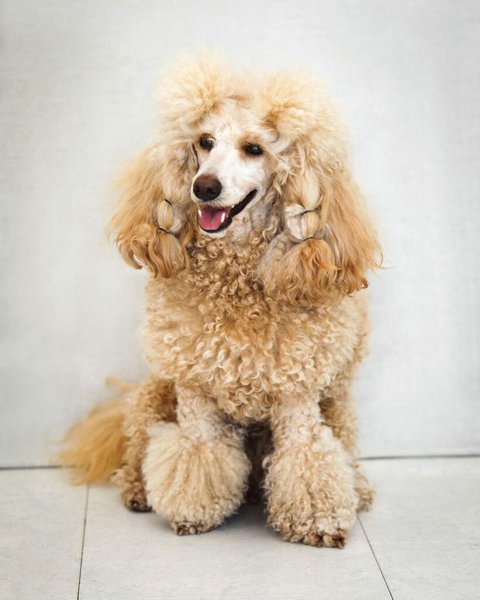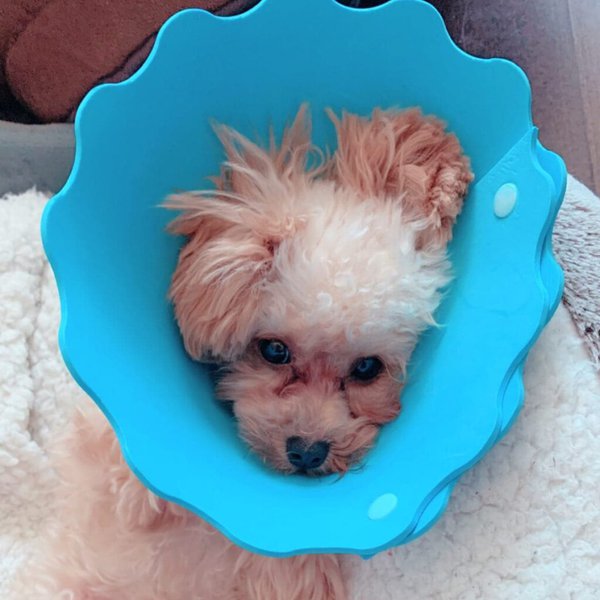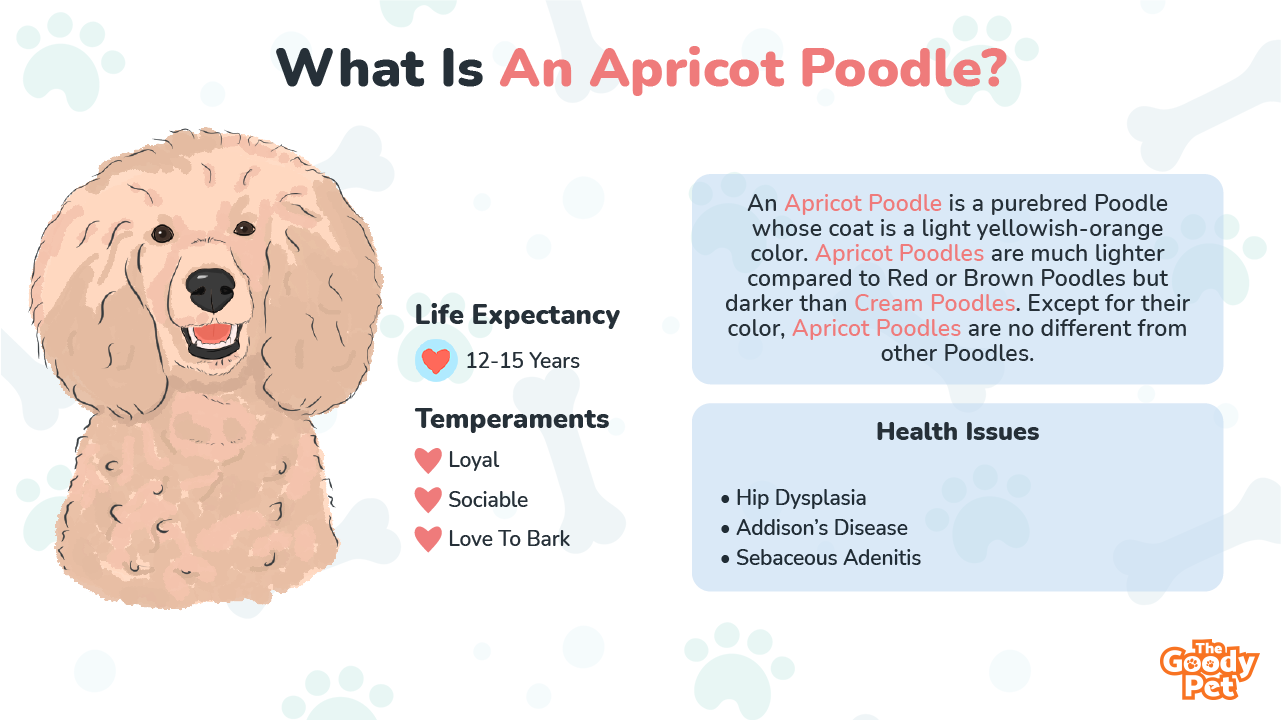I recently visited a friend, and she had one of the loveliest dogs I have come across. I just couldn’t stop fawning over this pooch. The dog I’m talking about is the Apricot Poodle. So, what is an Apricot Poodle?
An Apricot Poodle is a purebred Poodle whose coat is a light yellowish-orange color. Apricot Poodles are much lighter compared to Red or Brown Poodles but darker than Cream Poodles. Except for their color, Apricot Poodles are no different from other Poodles.
If you love the Apricot Poodle and are thinking of getting yourself one, the first step is to learn as much as you can about them. This guide is going to cover all the relevant information about Apricot Poodles. We’ll look at how the apricot color affects their health, how long they live, how to keep Apricot Poodles well-groomed, and their diet requirements. Before getting into that, however, let’s understand exactly what color Apricot Poodles are.
What Color Is An Apricot Poodle?
Apricot Poodles have a sunny, bright color that looks like a dilution of red. Actually, it is possible for Poodle puppies born with a red coat to fade and turn apricot.
Similarly, Poodle puppies born with an apricot coat can darken as they grow older and turn red. However, for a Poodle to be considered apricot, it needs to have been born with an apricot coat.
Most Apricot Poodles will have dark eyes and black points (eye rims, noses, lips, and toenails). While the breed standard allows Apricot Poodles with lighter points, this is not encouraged.
Are Apricot Poodles Rare?
Apricot Poodles are extremely rare. Actually, some breeders consider apricot to be the rarest Poodle color. This can be attributed to the fact that the apricot coloration is caused by a recessive gene that is very difficult to breed for.
Owing to their rarity, there is a very high demand for Apricot Poodles. Sometimes, people interested in Apricot Poodles have to get on a waiting list for months before a pup becomes available. This high demand, unfortunately, makes Apricot Poodles more expensive compared to other Poodle colors.
Apricot Poodle Size
With color being the only difference between Apricot Poodles and other Poodles, you can expect the Apricot Poodle to fall into one of the three official Poodle sizes – standard, mini, and toy. Standard Apricot Poodles are the largest and can get to a weight of up to 75 lbs.
Mini Apricot Poodles weigh between 12 to 20 lbs. Toy Apricot Poodles are the smallest and do not exceed 7 lbs.

How Long Do Apricot Poodles Live?
The gene that is responsible for the Apricot Poodle does not have any adverse effects on the dog’s health or life expectancy. This means that the average Apricot Poodle will live for an average of 12 years, with some even getting to 15 years or more.
Even though the apricot gene doesn’t cause any health issues, Apricot Poodles are still prone to the various health issues that other Poodles are vulnerable to. Some common health issues to watch out for if you have an Apricot Poodle include:
Hip Dysplasia
This condition is caused by the dislocation of the thigh bone from the hip joint socket. Dogs affected by this condition experience lots of pain when moving around, and with time, hip dysplasia can lead to total loss of movement.
Hip dysplasia is a hereditary condition, and therefore, it is possible to avoid this condition by ensuring that a pup’s parents were screened for the condition before breeding.
Sebaceous Adenitis
Sebaceous adenitis is an inflammatory condition that is common among all Poodles, including Apricot Poodles. Sebaceous adenitis affects the skin and causes scaling of the skin, blistering, itching, infections, and hair loss.
Addison’s Disease
Addison’s Disease is a condition that results from a malfunctioning of the adrenal glands, leading to insufficient production of the hormone cortisol.
Addison’s disease is a serious condition that can ultimately lead to death if left untreated, so it is important to seek medical attention if you suspect that your Apricot Poodle is suffering from Addison’s disease.

How To Take Care Of Apricot Poodles?
Dietary Needs
The amount of food to feed your Apricot Poodle will depend on their size. Standard Apricot Poodles have higher energy requirements and will therefore need about 3 to 4 cups of food every day, while toy Poodles will be okay with one cup. To reduce the risk of bloat, feed your Apricot Poodle 2 or 3 times per day, instead of giving them all the food at once.
One thing you should never scrimp on is the quality of your dog’s food. You need to make sure that the food you’re giving your Apricot Poodle is high quality food that is rich in nutrients.
We recommend feeding your Apricot Poodle with Pet Plate’s dog food. Aside from being rich in nutrients, Pet Plate’s dog food is made using the same standards that are required for human food.
In addition to giving your Apricot Poodle high quality food, we recommend supplementing the food with multivitamins for better health and immunity. To avoid dental issues, which Poodles are highly prone to, you should also invest in dental water additives.
Exercise Requirements
Owing to their high energy levels, Apricot Poodles require lots of exercise and mental stimulation. Once again, the amount of exercise to give your Apricot Poodle will depend on their size.
Toy Apricot Poodles can do with 2 exercise sessions daily, each session lasting 15 minutes, and can even be exercised inside the house.
Standard Apricot Poodles will need 2 exercise sessions daily, each session lasting 30 minutes, and will need to be taken outside, since they are too big to exercise indoors.

Do Apricot Poodles Bark A Lot? Temperaments Of Apricot Poodles
Anyone who has owned a Poodle knows that these dogs love to bark, and the Apricot Poodle is no exception. They’ll bark at anything they think you need to know about.
While this trait makes them great watchdogs, it can also be a nuisance to some people. Therefore, you should only get an Apricot Poodle if you are comfortable with their barking.
Temperament
The Apricot Poodle is no different from other Poodles when it comes to temperament. Apricot Poodles are loving, loyal and social pooches whose greatest joy is being in the company of the people they love.
These Poodles also enjoy getting attention, and they don’t hold back when it comes to reciprocating the attention they are getting.
If they were socialized from a young age, Apricot Poodles will be comfortable around all family members, and even other household pets.
Can Apricot Poodles Be Left Alone All Day?
One thing most people love about Apricot Poodles is how loving these dogs are. They always want to be next to their favorite human. However, this can be a disadvantage, because it means they don’t handle being left alone well. Actually, your Apricot Poodle can develop separation anxiety due to being left alone routinely.
To prevent your Apricot Poodle from developing separation anxiety, only get yourself this fido if your lifestyle allows you to be close to your dog every day. If you have to spend the day away from your Apricot Poodle, hire a dog sitter to watch after your canine buddy until you are back.
Will My Apricot Poodle Fade? Grooming Tips For Apricot Poodles
It’s good to note that Apricot Poodles sometimes change color as they grow and age. Apricot Poodles can either get lighter or become darker, but this is natural and shouldn’t worry you.
Are Apricot Poodles Hypoallergenic?
One of the reasons why Poodles are so popular is because they are hypoallergenic. They shed very little and are therefore good for people with allergies. The Apricot Poodle is no different. They have the same low shedding coat as all other Poodles.
Brushing
If your Apricot Poodle wears their hair long, the hair is prone to matting and tangling, which can in turn lead to hot spots and even infections. To avoid this, make a habit of brushing your Apricot Poodle every day.
Poodles also have sensitive skin, so brushing should be done using the right brushing tools that won’t cut your doggo’s skin. We have found the best brushing tool for Apricot Poodles to be the FURminator Undercoat Tool, due to its innovative design that allows it to glide smoothly over your dog’s skin, eliminating the risk of cuts.
Bathing
The beauty of having an Apricot Poodle is that they don’t get dirty easily, and therefore, they don’t need frequent baths. Unless your four-legged buddy has had a dip in the mud, giving them one bath after three months is enough.
Due to their sensitive skin, always use gentle dog shampoos to bathe your Apricot Poodle. Our top recommendation is Mighty Petz 2-In-1 Oatmeal Dog Shampoo And Conditioner, which is formulated with all-natural aloe vera that is perfect for dogs with sensitive skin.
Related Questions
What Is The Difference Between Red And Apricot Poodles? Red Poodles usually have a dark, rich color, while Apricot Poodles look like a lighter shade of red, often bordering on cream. Some experts believe that Red Poodles emerged from Apricot Poodles. One can easily confuse between the Red and Apricot Poodle, especially when a Red Apricot fades, or when the color of an Apricot Poodle darkens.
Is My Poodle Cream Or Apricot? Sometimes, Apricot and Cream Poodles can be very difficult to tell apart due to the closeness of their colors. However, Apricot Poodles have a darker and more vibrant color compared to Cream Poodles, and have dark points. It’s good to note, however, that Apricot Poodles can fade as they age and turn to cream.
Are Apricot Toy Poodles Rare? Apricot is the rarest Poodle color in the world. This is due to the fact that the apricot coloration is caused by a recessive gene that is carried by a very small number of Poodles. For a Poodle puppy to be an apricot, both the mother and father need to carry this recessive gene.





